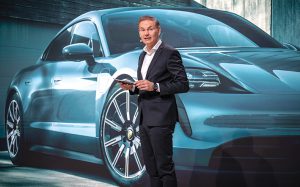BLOOMBERG
Volkswagen AG boosted its five-year investment plan to €180 billion ($193 billion) as Europe’s biggest carmaker intensifies a push to challenge Tesla Inc’s leadership on electric vehicles (EV). More than two-thirds of the total — €122 billion — will go to software and electric vehicles, the company said. The previous update of VW’s rolling investment saw the carmaker invest €89 billion in new technology, which was just over half of the total at the time.
“We have set clear and ambitious targets and took necessary decisions to streamline processes,†Chief Executive Officer Oliver Blume said in a statement. This year “will be a decisive year for executing strategic goals and accelerating progress across the group.â€
VW fell as much as 3.8% in early Frankfurt trading, outpacing losses in the STOXX Europe 600 Automobiles & Parts Index as the carmaker hiked its overall spending plan by 13% amid intensifying competition and pricing pressure.
Investors are keen for Blume, who took over in September, to reveal more about his strategic priorities after focussing on fixing the company’s chaotic software push and scrutinising costly projects. Volkswagen announced plans to build a battery plant in Canada, its first outside Europe, as the company seeks to fast-track an expansion in the key US market, which also includes a new $2 billion EV plant in South Carolina.
The “substantial†investments in VW’s battery business and spending on combustion engines to keep up with emissions regulation “will present a key worry for investors†concerned about drag on cash flow, Bernstein analyst Daniel Roeska said in a note.
VW attributed the rise in spending to its battery efforts, which include as many as six factories in Europe as well as securing raw materials to power EVs. The company’s PowerCo battery business is expected to generate sales of more than €20 billion by the end of the decade, VW said.
The carmaker is also investing in China, its biggest market, to better compete with local models to help stop a slide in market share particularly among EVs. While VW’s focus is on future technology, its combustion-engine investment will continue to rise before reaching a peak in 2025, when tough new Euro-7 emissions regulation in the European Union come into force.
Profit rose across all brand groups last year, including mass-market marques Skoda, Seat and VW, which eked out an operating profit gain to €4 billion in 2022, up from €3.5 billion the previous year even as deliveries declined. Delivering further gains will become more difficult as supply bottlenecks ease to boost vehicle output, Chief Financial Officer Arno Antlitz said in an interview with Bloomberg Television. “We have to prepare for tougher competition, specifically in our volume plans,†Antlitz said.
 The Gulf Time Newspaper One of the finest business newspapers in the UAE brought to you by our professional writers and editors.
The Gulf Time Newspaper One of the finest business newspapers in the UAE brought to you by our professional writers and editors.
